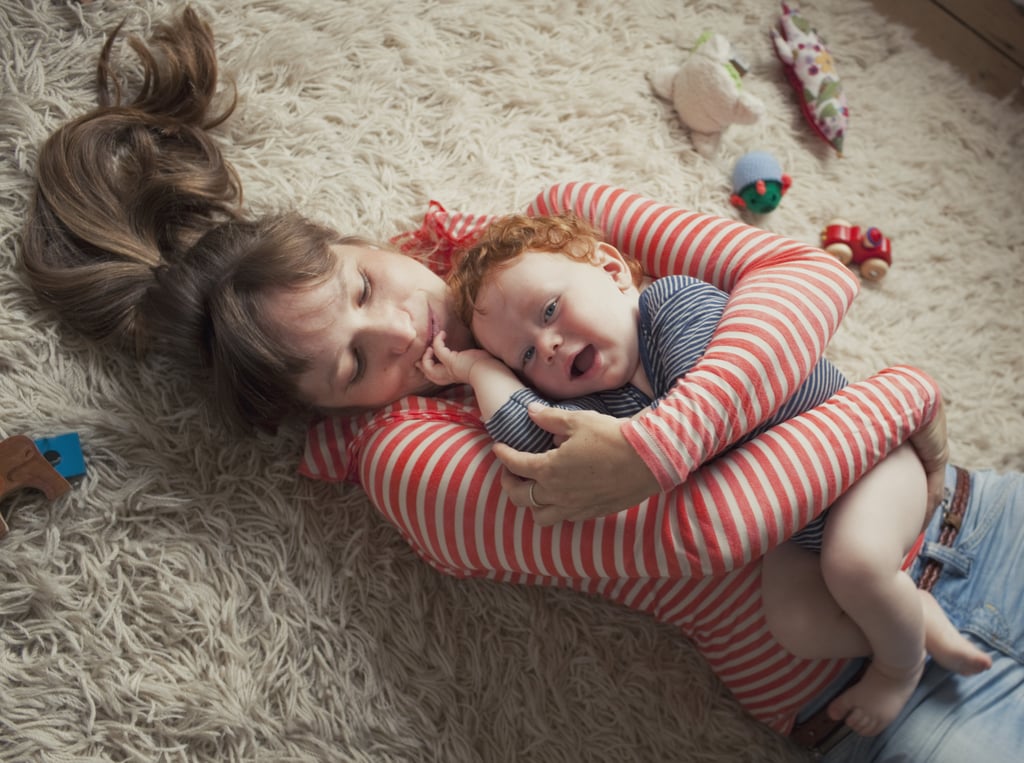I didn't know what to expect once I became a mother. But after having a baby, I learned some valuable lessons that I think mums-to-be should hear. Because growing a human is no simple mission . . . and then you must give birth to said human — asking your fragile, healing, postpartum body [1] to show more endurance and resilience than it has ever been asked to show before. Your delicate bundle is placed in your arms, and the world as you once knew it spins off its axis. The excitement is palpable and the congratulations are endless.
But then you return home and your supply of adrenaline may abandon you without warning. You may feel as though you are hanging from the edge of exhaustion, clawing and grasping for a glimpse of who you used to be [2]. The sleepless nights catch up with you. The seriousness of your newfound responsibility terrifies you. Loved ones may begin tossing their expectations into the mix — ones you have no desire to meet — and so begins the mum guilt [3].
I know from experience that even the wisest soul is incapable of preparing another person for the emotional and psychological complexities of postpartum and motherhood [4]. So ahead are 12 ideas to keep in mind — things I wish I had known before giving birth to my daughter [5] five months ago — that will support you through this life-altering transition. Remember — you can do hard things, Mum, but you must be soft with yourself in the process.

It may take a while to feel like yourself again, but remember that you are not gone.

Every birth represents a death to something else and, in this case, the birth of your child brings about the death of the selfish freedoms you have always known (and perhaps took for granted).
In the initial months of motherhood [7], I felt like I had been dropped into the arms of the greatest love story of my life, yet I was grieving. I ached for a glimpse of myself. I missed lounging in bed with a book in my hand, and soaking in long, bubbly baths, and sleeping in late — waking to stare at the ceiling fan while lost in the wandering of my own thoughts.
Don't be surprised if you find yourself feeling absent from your own life — yes, you're crawling into the same bed and using the same toilet, but moving through air that feels foreign and strange. The beautiful news is that the disorientation does not last forever, and you will soon relax into a more refined and resilient version of yourself [8].
It may or may not be an instantaneous "love like you've never known."

Neither reaction is indicative of what kind of mother you will become. Some maternal bonds are formed instantly, while others are cultivated gradually. There is no lightning strike or thunderous moment when the all-consuming love must begin. Your emotions surrounding motherhood [9] will not be the same as those of anyone else, because your life circumstances are not made up of the same experiences as those of anyone else. Don't put the instantaneous love and bonding pressure on yourself. You'll find your motherhood groove when you're ready – and that's perfect.
Live every moment against a backdrop of self-compassion and grace.

Because you'll need it. You know that cinematic image in your mind of the mother you think you are going to be — the one dripping with attentiveness, awe, and unwavering patience? How you will lovingly nurse [10] and rock your swaddled baby to sleep in the peaceful stillness of the dark hours night after night? I hate to throw cold water over your hopes and dreams, but it is likely that every moment isn't going to look like that. And you absolutely must forgive yourself ahead of time.
We forgive others for so many missteps throughout our lives — the lovers for their indiscretions, the friends who disappoint us, and the bosses who take advantage of us. But so often new moms do not forgive themselves for failing to live up to the fantasy [11] of the mother they thought they would be. Please give yourself the same loving compassion you would give a dear friend who is trying their best.
Know that some of your relationships will inevitably change.

Your childless friends [12] are incapable of understanding why you're suddenly canceling plans or showing up 30 minutes late. Why you can't accept a phone call as planned. Why you just zoned out mid-conversation.
Forgive them for their inability to understand the chaos of your new role and your shifting hormonal state, and know that they still love and support you, even if they don't quite understand. You likely did not grasp the nuances of new motherhood before you entered into it, so give your childless friends the same grace you want for yourself. The friendships that are strong [13] at their roots will be the ones that aren't blown away by the windstorm of the postpartum period.
Reel in the mum guilt. Now and forever.

The first time I attempted a workout postpartum, I was an absolute sobbing wreck. With every yoga pose [14], yet another tear fell onto the hardwood. I felt so monstrously guilty that I wasn't tending to my baby's every need. Another night, about a week later, I passed my baby off to my husband so that I could sink into a hot, relaxing bath. But I sat there soaking in the quiet, too anxious about the guilt that consumed me for leaving my baby for a few minutes that I couldn't muster even a semblance of relaxation and pleasure. I have since learned that taking respite on occasion is an essential ingredient to my emotional agility as a mother. And the more intentionally I permit myself to recharge and nurture the parts of myself that have nothing to do with being Mommy [15], the greater the reunion with my baby girl will always be at the end of every break.
So do your best to turn your back on the guilt [16], now and forever. Nothing productive results from it, and taking time for yourself will always be a vital ingredient in the success of your family.
Setting boundaries with your loved ones is essential.

Determine your boundaries [17] and set them clearly, or watch them be quickly defied. You have every right to protect your space. But this means you absolutely must communicate, respectfully and thoroughly, to others what your comfort level is [18] during this tender stage of healing and transition.
If you don't want visitors in recovery [19] or in the early weeks at home, politely refuse them. If you don't like something someone does or says around you or your baby, tell them. If you perceive that someone is being intrusive, overbearing, or dismissive of your requests, be clear in expressing what is troubling you. Otherwise, they may have no idea that they are upsetting you. And if they did know but opted to defy your boundaries anyway, you have every right to firmly and clearly state what you will and will not tolerate going forward.
You are not obligated to explain or justify your parental decisions and values to anyone.

No desire to breastfeed [20]? Don't want to join a certain community or religious organisation? Wish to put your child into a daycare curriculum early (or not at all)? Not comfortable with the thought of another person keeping your child overnight? You don't owe anyone an explanation (except for your co-parent, depending upon your situation) for why you wish to parent a certain way. Or not. Remember — your baby, your rules. And no explanation is owed.
It is not your responsibility to satisfy everyone's expectations about your baby.

Some friends and family members may make assumptions about how they will engage with your baby [21] — ones you and your co-parent do not feel comfortable with. You may experience a nagging pressure to do things a certain way because you or your partner were raised a certain way. But that's just it — you are both raised. And now it is your season to lay out a path for your child as you desire.
Just because others expect certain access or input into decisions, or assume you will carry on certain holiday traditions [22] in the same manner they chose to, does not mean you are obligated to satisfy those expectations. Not at all. Every generation and every parent-child dynamic is unique. Do your best to be considerate, fair, and inclusive with your loved ones, as this is a special time for them as well, but also know that you must never betray your own parental instincts and preferences in order to satisfy the expectations of someone else. Period.
You have the right to change your mind while navigating your way through new motherhood.

While pregnant [23], perhaps you committed to attending a specific family event or joining friends on a trip, but once the baby arrives, you realise you don't feel comfortable following through with those plans. The idea of exposing your baby to large crowds or leaving your baby for more than a few hours at a time just doesn't feel right.
The reality of parenthood [24] looks far different than the fantasy of it, so don't feel like you have to martyr yourself for changing your mind. The people who genuinely care about you and the well-being of your baby will understand and offer their unconditional support. You have the right to go with your gut, and sometimes your gut tells your mind to change.
You are not required to "cherish every moment." No matter what anyone says.

My daughter was colicky [25] in the second and third months of her life, and most nights during that period were spent in the trenches of hell. Every second felt like moving through mud. I needed ear plugs like I needed air and water. My husband and I were desperate and stressed, but mostly our hearts were cracking open for our helpless baby who spent far too many hours red-faced, arched back, and filling the night air with gut-wrenching shrills. It was crushing. In retrospect, I do not cherish those awful moments of elusive screaming — not a single one of them. Nor will I ever.
We do others a cruel disservice when we shame them for how they feel, or when we advise them to cherish moments that actually suck, and that test their sanity, and that require nothing more than sheer survival. No matter what anyone says, it's totally OK to not cherish every witching hour [26] that threatens the function of your eardrums. It doesn't mean you don't love and cherish your baby. It means you're being honest with yourself, and few things in life are more important than that.
Postpartum anxiety and depression are real. Don’t be ashamed if it happens to you.

When I was pregnant, I experienced multiple mums unpacking their relief about having dodged postpartum depression [27]. It was occasionally boastful — as though to say, "Yeah, I have no idea what that's about." I so badly wanted to be one of those women, and was confident I would be because my pregnancy had progressed so smoothly. But about a month or so after giving birth, I realised I had postpartum depression [28].
My doctor determined that, like many women, my hormones plummeted swiftly after giving birth, and my emotional state [29] was exacerbated by a person in my life who said and did things that made me feel extremely icky and uncomfortable — especially while fumbling through newfound motherhood. The beautiful news is that I was able to quickly get back on track and I've since learned that those trying weeks of anxiety [30], disorientation, and gloom were absolutely nothing to be ashamed of. If you encounter postpartum depression, do not entertain the thought that your body has failed you. You are far from alone, and help is readily available.
By all means, be in awe of that body of yours.

That precious baby in your arms? Your body grew every little part of him or her — from the bones to the organs to the eyelashes. You served as a portal by which a life entered the earth plane. You directly contributed to the ongoing of the human story. Whether your postpartum body [31] returns to looking like it did before or is never quite the same again, what you accomplished, no matter the range of complications and trials that may have arisen, is a gorgeous, honourable and miraculous assignment. Remember this truth and hold onto it tightly. May it empower you through every beautiful, disorienting, and hair-yanking complexity.